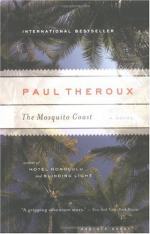|
This section contains 388 words (approx. 1 page at 400 words per page) |

|
The Mosquito Coast belongs to the tradition of the novel of character.
Father's speech and behavior rivet the reader's attention, even though Charlie serves as first-person narrator. Theroux traces Charlie's development as the action unfolds — he clearly matures, gains insight — but this change comes as a reaction to Allie's actions. The closest American precedent for this technique is F. Scott Fitzgerald's The Great Gatsby (1925), in which the narrator gives a detailed portrait of a complex character whom he both admires and fears. Gats by's death, like Father's, both haunts and liberates the narrator. A recent popular precedent is James Dickey's Deliverance (1970), a novel about a Georgia hunter and he-man who convinces three of his less rugged, city-softened friends to take a perilous canoe trip down a beautiful but dangerous river soon to be flooded as part of a dam-building project. The narrator here is...
|
This section contains 388 words (approx. 1 page at 400 words per page) |

|




